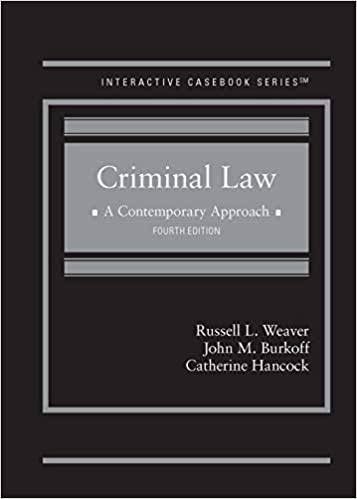no explanation necessary, just answers please
QUESTION 31 The warnings required under Miranda need not be offered to every person with whom a law enforcement official has an encounter. The rules, as construed by the Miranda decision, indicate that the Miranda warnings must be offered a person only where the person is in custody and police investigators hope to conduct is to be placed in an in person lineup following an indictment. has been arrested following the unsealing of a secret indictment. who was under arrest and who previously had refused to answer questions and the who police want to encourage to has been taken into custody and is to be taken to jail. 2 points QUESTION 32 Most nations, including the United States, have an interest in determining what products and people enter or leave through its borders. Searches, screening, and inspections are common and are lawful when conducted reasonably. At a fixed United States border crossing, everyone who crosses or attempts to cross the international border has federal agents may conduct reasonable searches, without probable federal agents must have probable cause or reasonable suspicion to search persons and motor vehicles when the person or vehicle the legal standard for searches follows the Terry v. Ohio stop and frisk None of the above responses states correct procedure and rationale. 2 points QUESTION 33 Fred and Barney had been sitting in Barney's car in the parking lot of a fast food restaurant while they shared blunt containing marijuana. Fred finished his Coca-Cola that he had purchased from the fast food restaurant but he left it in the cup holder of Barney's minivan. When they were finished smoking the dope, Fred put the last part of the blunt into Barney's ashtray. Fred walked to his own car. Police later pulled Barney over to talk to him since he had failed to use a turn signal. It was at this point that the officer smelled the marijuana odor in Barney's minivan. Barney was quick to roll over. He told the officer that the blunt belong to Fred and that the Coca-cola can was also Fred's. When the fingerprints from the Coca-cola can and the DNA from the Coca-cola can and the DNA from the blunt all matched and pointed toward Fred, he was arrested and charged with possession of marijuana. On these facts Fred has no chance to suppress the evidence of his marijuana possession unless Barney argues that Fred had not Fred has no chance to suppress the evidence of his marijuana Fred could argue that he had not abandoned the blunt and that he merely placing the Coca-cola can and the blunt in Barney's minivan None of the above statements is a correct response







